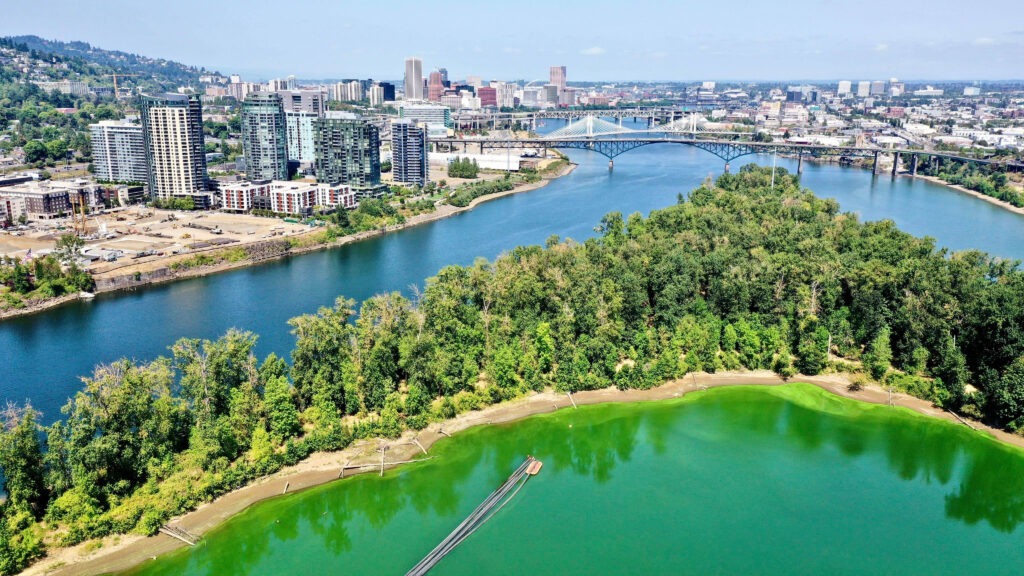
This spring, NEDC filed a new lawsuit against the Oregon Department of Environmental Quality in an effort to protect water quality in the Willamette River and Ross Island lagoon—a critically important location for fish, wildlife, and recreation in the heart of Portland.
From 1926-2001, Ross Island Sand and Gravel Co. mined the Ross Island lagoon. These mining activities significantly degraded the island and lagoon habitat, and since 1979 RISG has been required to perform restoration activities at the site—including the re-creation of upland forest, wetlands, and shallow water habitat important for threatened salmon and steelhead. Reclamation progress has slowed in recent years, and now, over 40 years since reclamation activities began, it is unclear when these activities will be completed. In the meantime, water quality in the lagoon is dangerous for salmon, steelhead, and other sensitive aquatic species.
The primary driver of these risks for aquatic species is a Harmful Algal Bloom, that has unfortunately been occurring more frequently in the lagoon in summertime. HABs thrive when three characteristics are found in a water body: warm temperature, nitrogen, and little to no water circulation—all conditions occurring at Ross Island Lagoon.
Because the reclamation activities involve depositing large amounts of fill material in the Willamette River, RISG must obtain a Clean Water Act permit from the U.S. Army Corps of Engineers to perform the work. A necessary component of this re-licensing process is obtaining a certification from Oregon DEQ (known as a “§ 401 Certification”) that these operations will comply with all applicable state water quality standards.
In October 2022, DEQ issued this §401 certification, despite significant concern from NEDC and other local conservation groups. And this spring, NEDC filed a lawsuit challenging the certification. The lawsuit argues that DEQ’s certification must include more robust conditions to ensure reclamation activities do not further degrade water quality in the lagoon.
“It’s important that these reclamation activities are completed quickly and successfully,” said Jonah Sandford, NEDC’s Executive Director. “But we cannot sacrifice water quality in this important habitat while the restoration activities are ongoing. DEQ has a key opportunity here to throw a lifeline to threatened salmon and steelhead, and make sure that the restoration work doesn’t further degrade this sensitive area.”
In the lawsuit, NEDC points to several water quality parameters that are impacted by reclamation activities, including dangerously high temperatures, increased turbidity, and the presence of Harmful Algal Blooms. NEDC argues that DEQ has failed to ensure, through its certification, that RISG will comply with these important standards.
NEDC is represented in this case by the Law Office of Karl Anuta, and by NEDC Legal Fellow Mary Stites.
Watch KGW’s coverage of this important case here!

